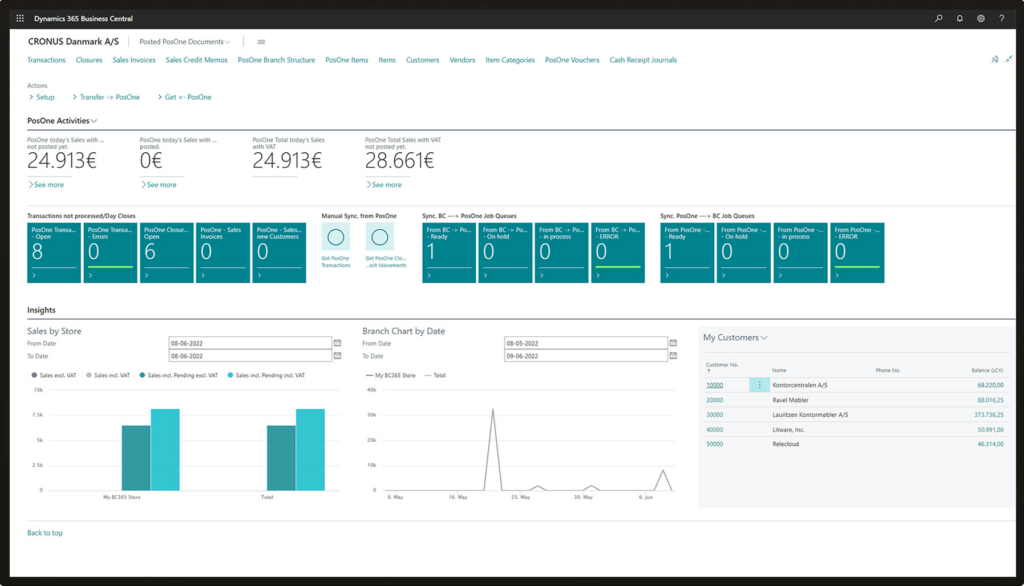
Looking for an ERP system for your SME? We would love to help you in your search!
In this article you get a list of five ERP packages that perfectly suit SMEs like you.
Also on this page, you will get four tips that will help you select, implement and use your ERP software. In particular, tip 3 and tip 4 will save you a lot of unnecessary costs!
First know what ERP is? Click on this link and see immediately and what this type of software is and what the benefits are.
Content of this article
Below you will find the best ERP systems for small and medium-sized businesses:
* Note that the ultimate "Best" ERP doesn't exist. Every unique situation demands a different solution. System X might be the best pick for you. This doesn't mean that system X is the best for every company.
Exact offers different solutions by industry. The focus here is clearly on SMEs.
This company offers ERP systems for SMEs active in commerce, manufacturing, business services and construction.
Do you belong within one of these four segments? Then it's worth putting Exact on your shortlist!
What makes this provider unique?

This package is seamlessly integrable with your other Microsoft Apps.
Are you already using one or more Microsoft software? Then Business Central is a good option for your business.
What makes this provider unique?
Wondering what this package looks like? Check out one of the images of this package below. Want to see more examples of ERP systems? You'll discover it on our page of 11 ERP examples.

Odoo offers a system that has both ERP and CRM functionalities. In addition to the ERP features, this package includes email marketing and social media modules.
In addition, Odoo's standard package will cost you only about 20 euros per user per month. Be sure to check if this "standard" package is enough for you!
What makes this provider unique?
For a rough cost indication, you can use our ERP-cost calculator.
This software focuses on suppliers and companies in the installation and manufacturing industries.
Specifically, this vendor offers software for companies in industries that work with metal, wood, and plastic, among others.
What makes this provider unique?

In our opinion, this is a solid package. SAP is one of the systems with the highest market penetration. SAP is the market leader in the Netherlands with about 30% market share.
Business One is a flexible and adaptable system. Ideal for fast-growing organizations!
What makes this provider unique?
The short answer: "An ERP solution gives you more insight into your business operations."
The slightly longer answer: An ERP provides more insight into your processes. This allows you to work more focused toward your goals. With ERP software, you get live insight into your key data.
Without insight into your key metrics (or KPIs), it is difficult to adjust and optimize toward your desired goal.
A Google or a Microsoft has virtually unlimited financial resources. For the average SME, this is unfortunately different. With ERP software, you use your limited resources as efficiently as possible.
An ERP system gives you insight into your inventory levels and your cash flow. Is your cash flow negative or positive? Is cash flow an important figure for you? Then real-time insight into this KPI is essential!
Want to learn more about the advantages and disadvantages of ERP? Check it out on our page with 5 pros and 5 cons of ERP.
The biggest benefits of ERP at a glance:

Below I give you several tips. These tips will help you in the selection, implementation, and use of your (new) ERP system.
We give you the tips below. Read on and get an additional explanation for each tip.
Lets start with perhaps my most important tip: "See your system as a tool to your purpose."
Your ERP package is not the holy grail. As such, we at SoftwareMatching.io recommend that you see your software as a tool. Your package serves as a tool to your goal.
Ask yourself where you want to go with your SME business. Where do you want your company to be in five years? For example, do you want to turn over 10 million euros a year in five years? A good ERP solution will help you work toward this goal.
So don't just go out and buy a system. Think about what you want to achieve and use your software as a tool!
We always recommend choosing an ERP package that is not unnecessarily complex.
Still, as an SME, you can benefit tremendously from the somewhat advanced features of ERP packages.
In the wholesale sector, for example, forecasting functions are crucial. This allows you to optimize your inventory management, minimize surpluses and finance your next purchase based on realistic sales forecasts.
Are you active in construction? Then you might want a solution for project management and calculation.
Or are you a company in the manufacturing industry? Then advanced functions for material requirement planning (MRP), workshop modules and production planning are essential.
As you can see, completely different functions are useful for each sector.
In short: have a look at the more complex functions of ERP software. Check what is of extra value for your company and for your sector. This extra investment will pay off!
Want more information about our ERP comparison tool? Discover it on our page about how we compare ERP software per sector and company size via our free software.
In my opinion, 99.9% of SMEs can get by just fine with a standard ERP package. Customizing your software is unnecessary.
We therefore advise you to adapt your business processes to the standard software. Follow the processes as they are defined in the software.
Are you not doing this? And are you going to configure the software based on your own unique process? This will cost you a lot of extra time and money. Your implementation costs will shoot through the (proverbial) roof!
In technical jargon, we call the above two options: Fit-To-standard and Gap-To-Fit.
Going for Fit-To-Standard? Then you start looking at how you can make your standard software fit your business processes with extensions and customizations. To do this, you have to put out a lot of extra work with expensive implementation partners. The hourly wages of these types of companies don't lie!
If you opt for Gap-To-Fit, then watch your current processes connect to the processes in your standard software. In our opinion, this is the best option for just about every SME!
Want to get in-depth insights on implementations? Together with an implementation partner, we made an extensive article about implementing ERP software. Check it out via the link!
We recommend that you negotiate with multiple ERP partners. This way you are in a stronger negotiating position.
I speak from my own experience that in most cases you can get nice discounts!
Get quotes from multiple vendors. Compare the prices and look critically at the functionalities and service conditions. Be critical and do not let yourself be seduced by the (too nice) stories.
Want to verify if those great stories from your supplier are true? Then use our bonus tip below.
Bonus tip: We advise you to approach comparable SMEs by phone. Ask them how they experienced the cooperation and find out if the supplier was honest with you.
Looking for more advice on how to select the perfect ERP-partner? You will find it on our page with tips on how to select a good ERP-vendor.

In this article you already got to see some suitable ERP systems for SMEs.
Still, we advise you to always choose a package, which suits your specific situation and needs. No two SMEs are the same.
So we recommend that you fill out our free and no-obligation ERP comparison tool.
Want to know if one of these systems comes out best in the comparison? Answer a few questions about your situation and find out!